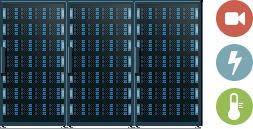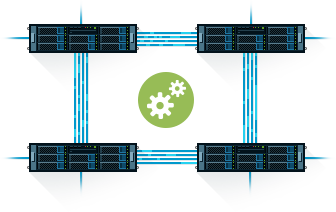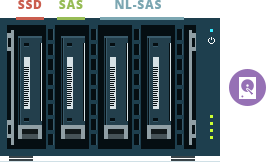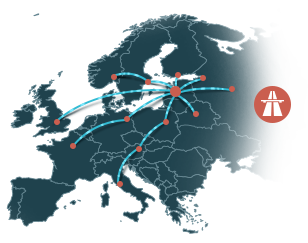Our cloud infrastructure

Data Center Features
Our compute infrastructure spread across two geographically independent sites within Riga. Both data centers were constructed in 2010s, and comply with all of the modern requirements of Uptime Institute Tier III standard. The redundant cooling and environmental control system maintains an optimal level of humidity and temperature. Our modular Newave UPS system has an N+1 level of redundancy. If the power supply from the municipal electric network suffers an interruption of more than 30 seconds, the diesel generator SDMO initializes automatically. This high-quality, industrial grade equipment does not have a time limit for the annual usage. A certified security guard is vigilant at the data center on a continuous basis 24/7. We strictly follow a policy of visitor registration and supervision while on the premises. CCTV monitoring covers the entire grounds and all its facilities at all times.

Computing infrastructure
We primarily rely on modern Dell servers as our high availability cluster nodes. Each of them is equipped with an Intel Xeon E5v3+ and Intel(R) Xeon(R) Gold CPUs. As an atomic CPU resource allocation unit, we use virtual CPUs (vCPU), which maps to one physical CPU core with at least 2Ghz frequency. Our computing clusters are built in such a way that there is always at least one host reserved for failover (N+1 redundancy), which always ensures maximum uptime. Production networking is fully redundant and is built on Arista and HPE enterprise level hardware. Each host connects to the core network with at least 2 redundant 10GbE links. If your project has any special requirements for networking, it is possible to install and host a dedicated network equipment just for You.

Data Storage System
The Data storage architecture is built on Hitachi Data Systems products. It is an enterprise class solution with a vendor guaranteed data availability at the level of 99,999%. All hard drives are reserved according to the N+2 scheme with 10 disks in each RAID group. The data is transferred between the system and servers via optic cables using the Fibre Channel protocol at a speed of at least 8 Gb/sec. The links are redundant according to 2N policy. The storage tenant for each customer’s virtual data center is configured according to the required space and performance. For this reason, the system consists of several disk pools with different performance characteristics. Users independently configure necessary capacity from appropriate disk pools: NL-SAS, SAS10K and FMD (Flash Module Drive or Hitachi Accelerated Flash – technology that significantly outperforms standard SSD drives) using self-service management portal.
VMware vSAN (All-Flash) solution is also available as primary production storage. This is hyperconverged storage clustering solution specially designed for VMMare virtual workloads and provides great reliability and performance. Users may select necessary performance policy and required capacity through self-service management portal as well.

Control and Management System
The VMware virtualization platforms unite server computing power and storage systems in a reliable cluster ensuring high availability levels for the virtual machines. Working with our virtual infrastructure does not require that the user’s have any special familiarity with virtualization technologies. Customers manage their assigned resources in the virtual data center through the self-service web portal - VMware vCloud Director. They have the ability to create, delete or clone virtual machines, to redistribute resources among machines, and to configure private virtual networks and their remote access to them. The remote access to the virtual data center can be organized either as a direct connection via a public Internet network or using secure VPN tunnels: IPSec or SSL.

Internet
Two geographically independent links connect our data centers with the largest Latvian ISPs - Telia and Lattelecom using BGP dynamic routing protocol. Site-to-site connectivity between data centers relies on two geographically independent links. The bandwidth to the biggest local Internet exchange networks (LIX, SMILE) reaches as high as 10 Gb/sec, and the delays do not exceed one millisecond. Depending on particular project needs 100Mbps or higher link capacity reserved for each tenant. The average uptime rate for Internet connection is 99,99%.

Data Security
The default virtual machine backup and restore solution is built on Veeam Backup and Replication software. Our IaaS service offering normally includes the consistent backup copy for every virtual machine once a day with a retention period of 14 days by default. The backup copies are stored on the separate backup storage solution - EMC Data Domain and are replicated at the remote site. If the default backup solution does not comply with your requirements, our engineers will work out an individual configuration tailored for your project. Our advanced backup solutions may employ Veeam Backup and Replication or Commvault data protection products.

Support
Technical support service works 24/7 without holidays and coffee breaks. Our engineers have passed Dell, HDS, VMware, Veeam, EMC, Microsoft, and other required vendor certifications. Constant monitoring and preventive maintenance activities are carried out on a continuing basis. Engineers help users to transfer their existing infrastructure into the cloud, answer related questions, consult users about self-service portal features and tools and, of course, resolve any customer problems. These services are available at no additional cost to each of our customers. Customer OS and application administration jobs can also be outsourced to us if necessary. The service level agreement (SLA) and non-disclosure agreement (NDA) is composed for each project individually.
